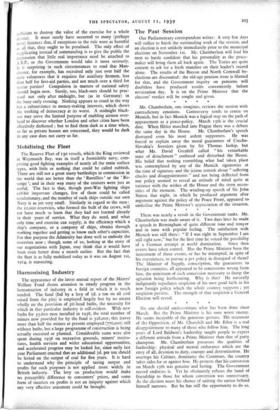Humanising Industry
The appearance of the latest annual report of the Miners' Welfare Fund draws attention to steady progress in the humanisation of industry in a field in which it is much needed. The fund (fed by a levy of Id. a ton on all coal raised from the pits) is employed largely but by no means wholly on the provision of pit-head baths, the necessity for which in that particular industry is self-evident. With new baths for 55,600 men installed in 1938, the total number of miners now provided for by the fund is 328,000; this leaves more than half the miners at present employed (770,000) still without baths, but a large programme of construction is being actually executed or planned. Considerable sums were also spent during 1938 on recreation grounds, miners' institu- mtes, health services and wider educational opportunities, and accelerated progress may be looked for, since early last year Parliament enacted that an additional id. per ton should be levied on the output of coal for five years. It is hard to understand why the principle of taxing output and profits for such purposes is not applied more widely in British industry. The levy on production would make no perceptible difference to consumers' prices, and some form of taxation on profits is not an iniquity against which any very effective argument could be brought.








































 Previous page
Previous page